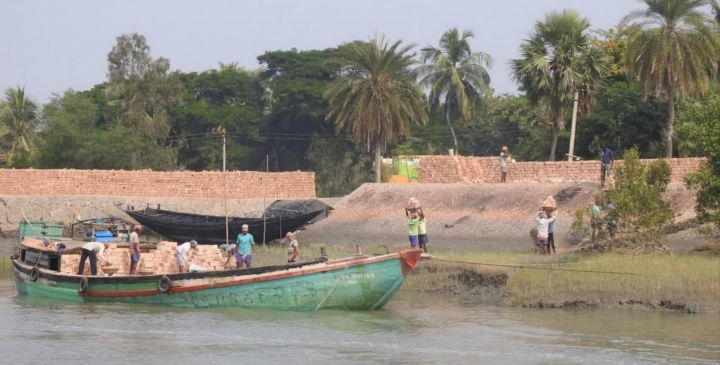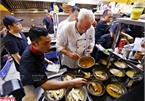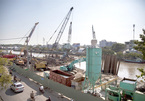 |
|
Photo: British Embassy
|
The UK Research and Innovation (UKRI) Global Challenges Research Fund (GCRF)’s Living Deltas Hub’s five-year research program The Hub (www.livingdeltas.org), led by Newcastle University, has been launched to safeguard the future of deltas through more resilient communities and sustainable development.
In Vietnam, the Hub involves six research organizations, with approximate funding of $2.6 million across the two delta networks of the Red River and Mekong River.
The launch was attended by representatives from the Ministries of Science and Technology, Planning and Investment, Agriculture and Rural Development, and Natural Resources and Environment.
It also welcomed leaders of people’s committee and related government departments from nine cities and provinces involved in the project: Thai Binh, Ninh Binh, Hai Duong, Bac Ninh, Hung Yen, Nam Dinh, Vinh Phuc, Hai Phong, and Ha Nam.
The Red River and the Mekong Delta are vital social-ecological systems and food baskets, but the landscapes and livelihoods of those that rely on them are under huge threat from human exploitation and environmental degradation.
Vietnam is defined as one of the countries most affected by climate change. Seventy per cent of the Mekong Delta is assessed as highly vulnerable to flooding, with 7 million people at risk, while 25 per cent is predicted to be unusable by 2100 under the Fifth Assessment Report of the Intergovernmental Panel on Climate Change (IPCC).
As risks increase, the need for locally-rooted sustainable development strategies underpinned by traditional knowledge becomes ever greater.
In this context, the Hub will focus on both the Red River and the Mekong River in Vietnam, operating on a model of equitable partnerships with delta-dwellers and the research community, working together to strengthen capacity and develop new knowledge and understanding of the deltas’ culture, heritage, and livelihood changes, including youth and gender, delta characterization and risk assessment, natural baselines and environmental change, and coastal interventions, to raise resilience.
“The urgent need for the Hub is clear as human impacts increase and the necessity of sustainable development strategies underpinned by locally-rooted knowledge becomes ever greater,” Professor Andy Large, Director of the Living Deltas Hub and based at Newcastle University, said at the launch.
“Reduced coastal resilience because of mangrove loss in the Red River Delta has had dramatic cultural effects on the lives of local communities, especially women and girls”, Dr Hue Le from the Vietnam National University, Hanoi, said.
The Hubs are among the most ambitious investments the UK has made to date in international development research, according to Professor Andrew Thompson, UKRI Executive Chair for International Development and Executive Chair of UKRI’s Arts and Humanities Research Council (AHRC).
“They provide a framework for the wider GCRF portfolio and promote dignity and prosperity for some of the most disadvantaged and hardest-to-reach people on our planet,” he said.
“Scientific research is the core of a successful university sector and essential for an innovative economy,” said British Ambassador H.E. Gareth Ward.
“This cooperation will help Vietnam navigate the pressure of climate change, preserve its natural and cultural heritage, and thrive with sustainable economic development.”
Besides Vietnam, the Living Deltas Hub also reaches the delta of Bangladesh and India, bringing together 22 research organizations from across the world. The Living Deltas Hub is funded through the GCRF, a key component in delivering the UK AID strategy, and puts UK-led research at the heart of efforts to achieve the UN Sustainable Development Goals (SDGs).
The Living Deltas Hub stands among 12 interdisciplinary research Hubs funded by the UK Government. Working in partnership with researchers, governments, international agencies, NGOs, and community groups, these Hubs will share knowledge and expertise to develop innovative and sustainable solutions to help make the world safer, healthier, and more prosperous.
UKRI works in partnership with universities, research organizations, businesses, charities, and government to create the best possible environment for research and innovation to flourish. It works with its many partners to benefit everyone through knowledge, talent, and ideas.
Operating across the whole of the UK with a combined budget of more than $9 billion, UKRI brings together the seven Research Councils, Innovate UK, and a new organization, Research England.
The GCRF is a $2 billion fund and forms part of the UK Government’s ODA commitment to supporting cutting-edge research and innovation that addresses the global issues faced by developing countries.
It harnesses the expertise of the UK’s world-leading researchers, focusing on funding challenge-led disciplinary and interdisciplinary research, strengthening capabilities in research, innovation, and knowledge exchange, and providing an agile response to emergencies where there is an urgent research or on-the-ground need.
The fund is overseen by the Department for Business, Energy and Industrial Strategy (BEIS) and is delivered through nine partners, including UKRI, the UK Academies, the UK Space Agency, and other funding bodies. VN Economic Times

British chef introduces Vietnamese food to the world
Michelin-starred chef John Burton-Race has come to Vietnam to create meals with courses combining European and Vietnamese cuisines.

Mekong Delta takes measures to cope with saltwater intrusion
Saltwater intrusion has occurred on a large scale in the Mekong Delta, forcing local authorities to take measures to protect agricultural production and ensure water supply for household use.
 The British Embassy in Vietnam has launched a project that will support Vietnam’s delta network and sustainable development.
The British Embassy in Vietnam has launched a project that will support Vietnam’s delta network and sustainable development.